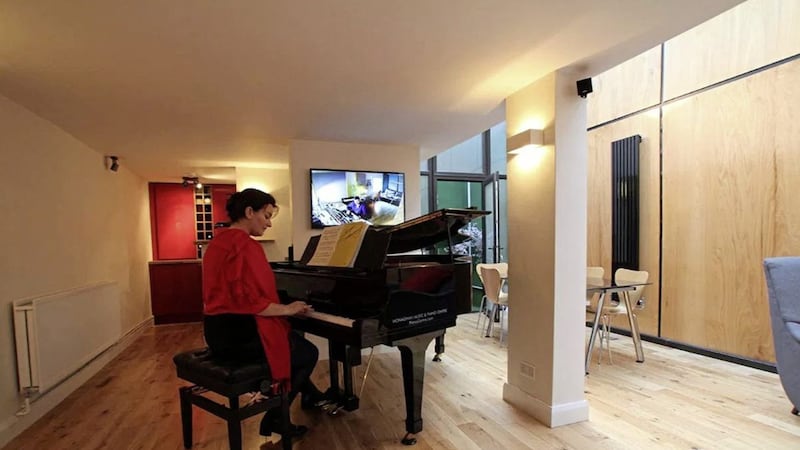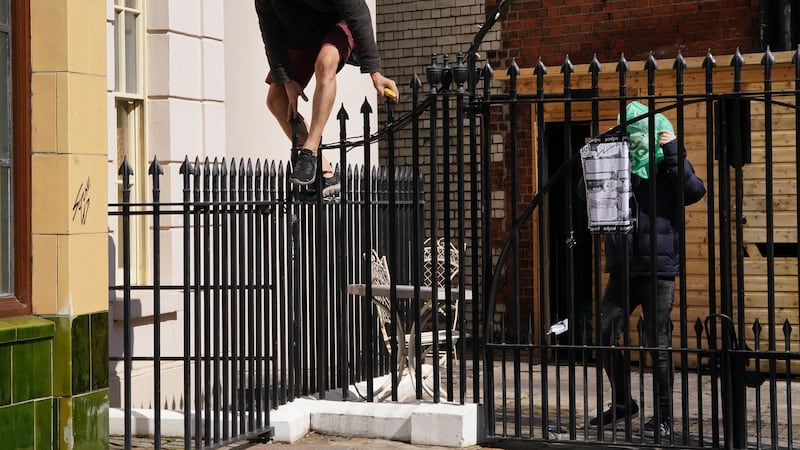ALMOST two years ago I left the bustle of traffic on the Ormeau Road and headed into the tranquility of the RedBox studios on University Street in Belfast.
There, Duke Special and Ulaid (Dónal O’Connor, John McSherry and Seán Óg Graham) were playing Lon Dubh Loch Lao, the music as delicate as the scribe’s pen with which with the words were written, overlooking Belfast Lough, in the ninth century.
It was an honour to see such superb musicians play with such reverence and precision and to see beauty created in front of my very eyes and ears.
It was Claude Debussy (allegedly) who first talked about the space between the notes and that has become common currency among serious musicians. In that vein, RedBox is aimed at capturing the essence of its recording artists, whether it’s Muireann Nic Amhlaoibh’s beautiful vocals or Steph Geremia’s flute playing or the techno-trad of the olllam.
The idea behind the recording studio – there is so much more to this sonic wonderland than making albums – came in 2013 as Oonagh Derby, a singer-songwriter from Co Armagh explained to me.
“Around five years ago, Dónal O’Connor, Cormac O’Kane and I had a recording studio in an old dilapidated mill in Beersbridge and our lease was coming up. Now, I’m a quantity surveyor and project manager by profession and I suggested we find a property and build something ourselves.
“At the same time, we were working with journalist Liam Creagh who owned RedBox Media and he was also looking for premises, so we did a scan and I found these premises in University Street which we were able to buy at auction and in that way we came together as a group of creatives under the name of RedBox Studios.”
There are now three or four creative companies in the building but even over the five years of its existence, Oonagh has seen the premises change and develop, due mainly to innovations in all the related technologies.
“When we started out, for example, the middle and top floors were designed as recording studios but they have evolved into TV studios so now we do a lot of live streaming and music videos and the music scene has changed so much. Just about everyone has a studio nowadays and there are no CD sales as such but we are always watching developing trends and hopefully predicting what is coming next,” Oonagh says.
While RedBox does all kinds of music – Dónal O’Connor is almost ubiquitous on the trad scene while technical wizard Cormac O’Kane has a CV as long as your arm, is an accomplished jazz musician and was the musical director for RTÉ’s Ireland’s Got Talent, and Armagh-born Oonagh herself is a talented folk singer/songwriter – for me, RedBox is a real seedbed of traditional and folk music.
Is there a special art to recording folk and trad? I ask Oonagh.
“Well, to produce folk and trad, I think you need to love it. It’s quite a sensitive genre but at the same time, depending on the artist, some are more into fusion than others.
“We have purists like the Vallelys or Martin Dowling, for example, but then you have fabulous new, sexy sounds coming through as well and I’m thinking especially of Niall Hanna here, although there are so many others.”
“We are the TV company behind TG4’s Fleadh TV and if you look at the Fleadh now, it’s more Hollywood, more professional, people are becoming more confident in their playing. Trad is no longer the guys in the back bar, it’s much more glamorous and RedBox has a role in that as well, I think,” says Oonagh.
Is there a RedBox sound?
“RedBox has producers who have come from generations and generations of Irish traditional music and Irish-speaking families and we have been able to harness all the 21st century technology to allow them to be true to their roots and where they came from as well. Nothing is overdone, it is simply done and we let the music do the talking.”
But there is more to the University Street studios than the music. Oonagh says that some artists turn up for a recording session without knowing exactly what is it they are looking for. In order to give musicians and singers time to focus on what they want, the space has been designed to make them relax as much as possible.
“We created big spaces with lots of light where artists can sit and imagine and ponder for a while. A lot of them are nervous when they come through our doors.
“When Dónal is recording he will relax the musicians, he will relax the music and in the evening, by candle-light, it’s just a matter of letting the music flow naturally and letting the talent tell their own stories,” says Oonagh.
That said, RedBox can handle big bands and choirs and orchestras as well as solo artists. For the latter, the studios sometimes organise intimate evenings called the RedBox Sessions where, if a particular artist is bringing an album out, they might want to try out some tunes in front of a small audience to see how they go down and what works really well.
Another field that RedBox excel in is in television and they are now gearing up for their coverage of Fleadh Cheoil na hÉireann which is running from August 12-19 in Drogheda.
Anyone who has seen the nightly shows either on TG4 or online can’t but be amazed by the professionalism of the whole production as it goes out live on television and streamed throughout the world.
“It’s crazy,” says Oonagh. “We might have four live gigs going on at the same time and you lose pounds in nervous energy working on it but we’re hell-bent on getting the tradition out there."
Of course, Belfast has been a mecca for traditional music for half a century and it is fitting that the city should have the best facilities for recording that for posterity. It can be quite painful listening back to those tinny LPs from the 1960s.
“Irish music at the time, when we were coming through the Troubles, had to be this back-room, scratchy thing that was almost hidden and out of sight and that was the way we preserved our culture – but now look at it.
"I love watching it make its way to the fore, where you have Beoga teaming up with Ed Sheeran and there is such a critical mass of talented outward-looking young people who are making the tradition their own, it’s almost like watching a flower whose time has come to bloom,” says Oonagh.



